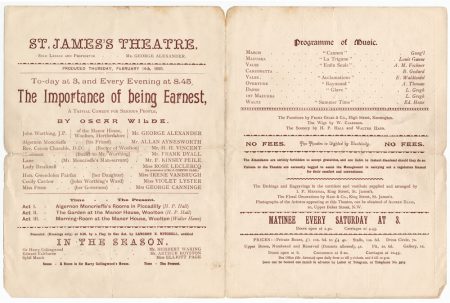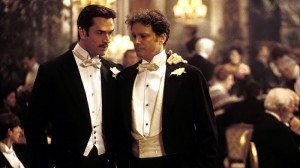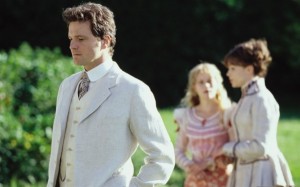 The London Society (note the capital “S”) of Oscar Wilde’s time obeyed strict rules of propriety, especially in the upper classes Wilde is targeting poking fun at in The Importance of Being Earnest. The following terms are provided to help you navigate the British drawing room culture more smoothly.
The London Society (note the capital “S”) of Oscar Wilde’s time obeyed strict rules of propriety, especially in the upper classes Wilde is targeting poking fun at in The Importance of Being Earnest. The following terms are provided to help you navigate the British drawing room culture more smoothly.
NOTE: There may be some confusion regarding the difference in Gwendolyn’s and Lady Bracknell’s names. British peers like Gwendolyn’s father would have both a family name and a title. In this case, the family name is Fairfax. Wilde does not use his first name, as that would be wildly improper, so we’ll just invent one for him: George. Therefore, Gwendolyn’s father would be Mr. George Fairfax, Lord Bracknell. He is married to Augusta Moncrieff Fairfax, Lady Bracknell. Lord and Lady Bracknell would be referred to by their titles in society and by their names only by family. Gwendolyn, as the eldest daughter, would be Miss Fairfax, since she does not hold the title. Jack and Algy are gentlemen without titles, so they are Mr. Worthing and Mr. Moncrieff.
ACT I
morning-room – informal sitting room for daytime use
salver – serving tray. Personal cards, tea items, mail, etc. were usually offered on a salver to the gentleman or lady of the house by a servant
Scotland Yard – headquarters of the London metropolitan police
sent down – asked to escort a lady to the dining room
crumpet – a small, unsweetened cake cooked on a griddle and usually served toasted
Grosvenor Square – residential area for the well-to-do
Liberal Unionist – member of England’s Liberal Party opposed to home rule for Ireland
Tories – members of England’s Conservative Party
purple of commerce – wealthy businessmen who were given titles in the late Victorian period
cloak-room – room where luggage can be checked
the Empire – popular theater and amusement hall
smoking jacket – a man’s lounging jacket, usually of velvet or silk, for wear at home
ACT II
Mudie – a lending library in London
Evensong – evening worship service
buttonhole – flower worn in a lapel buttonhole (no gentleman would go without one)
portmanteau – leather suitcase
dog-cart – open, horse-drawn carriage, originally with a special seat for a hunting dog
lorgnette – handheld eyeglasses attached to a handle
ACT III
terminus – British term for a station located at the end of a transportation line
Court Guides – books containing the names and addresses of people in high society
Funds – government bonds of Great Britain
Oxonian – student at or graduate of Oxford, a prestigious English university
Anabaptist – religious group founded in the sixteenth century in Switzerland who believed in adult, rather than infant, baptism
perambulator – baby carriage

 Oscar Wilde, the Irish playwright who became the darling of British high society, is probably the best-known and most-quoted satirist of the late 19th century. Born in Dublin, Ireland in 1864, Wilde became a well-known lecturer, essayist, and playwright who enjoyed near-universal popularity until the shocking trial that ended his literary career and, not long after, his life.
Oscar Wilde, the Irish playwright who became the darling of British high society, is probably the best-known and most-quoted satirist of the late 19th century. Born in Dublin, Ireland in 1864, Wilde became a well-known lecturer, essayist, and playwright who enjoyed near-universal popularity until the shocking trial that ended his literary career and, not long after, his life. The next year, Wilde’s first play, Lady Windermere’s Fan, made its debut to great acclaim. Playwriting became Wilde’s preferred literary style. Lady Windermere’s Fan was followed in short order by A Woman of No Importance in 1893 and both An Ideal Husband and his most famous play, The Importance of Being Earnest in 1895. Each of these works skewered the pretensions of British high society through clever wordplay and Wilde’s satirical wit.
The next year, Wilde’s first play, Lady Windermere’s Fan, made its debut to great acclaim. Playwriting became Wilde’s preferred literary style. Lady Windermere’s Fan was followed in short order by A Woman of No Importance in 1893 and both An Ideal Husband and his most famous play, The Importance of Being Earnest in 1895. Each of these works skewered the pretensions of British high society through clever wordplay and Wilde’s satirical wit. 

